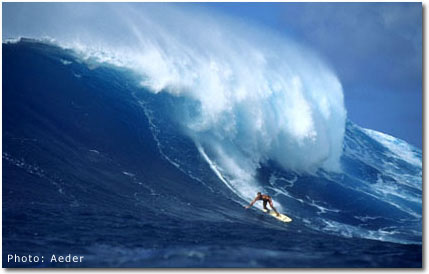

There are thousands of surfers throughout the world and, among them, small wave riders who have reached a recognized level of excellence. But when the surf gets above fifteen feet, the crowds thin to a modest few who enjoy the thrill of pushing themselves into big surf. Why do people become big-wave riders? There are probably as many answers as there are big-wave riders. Whatever the reasons are for doing it, no one will dispute the need for excellent physical and mental conditioning. Successful surfers will be the first to admit, it is not an option.
But how much attention is paid to the mental conditioning that must take place before you commit to big-wave riding? There is no doubt that you must be in great physical shape in order to paddle out (sometimes a half- mile just to reach the break), swim in strong currents, or withstand the beating of set waves that can consistently top fifteen feet. But physical conditioning alone does not qualify you to go out into big surf. Strength and physical conditioning become neutralized when fear and panic take over-hyperventilation, fatigue, and incoherence can reduce anyone to a piece of driftwood in a matter of seconds.
The key to successful big-wave riding is proper mental conditioning, in addition to good physical preparation. In this case, mental conditioning means to what extent you can remain cool, calm, and in touch with your surroundings when a condition becomes serious. Your mental state when trapped under a gigantic wave can be the determining factor as to whether you live or die.
Focus-learn to be calm. Put yourself through the worst case scenario-play out an entire session in your mind. Imagine the worst and take it through its course, from wipeout to getting back into the line-up. This process of learning to find calm in a life and death situation doesn't come easily, or quickly. After 16 years of surfing big waves, I consistently feel more and more relaxed with each passing season. Every season, I learn.
A particularly important part of this learning process, is breath control. Breath control is obviously one of the primary concerns when being held down under tons of water. The more you can relax, the more efficient your breath control-easy to talk about, difficult to do. But it all starts with mental conditioning. The breath control will come in proportion to your ability to relax.
How do you relax when the situation becomes serious? Some fortunate people have naturally calm and relaxed characteristics that carry over into their big-wave riding. The majority of surfers, however, have to learn to push themselves through their fears in order to achieve this necessary state of calm.
As winter approaches, those of us who ride the big, blue mountains, will think of memorable sessions filled with adrenaline-rush and exhilaration. Nothing can match the feeling that comes from launching oneself over the edge of these mountains.
The question we have to ask ourselves every time we paddle out, "is my body and mind ready for the challenge the blue mountains have to offer?"

 Back to Surf Home
Back to Surf Home